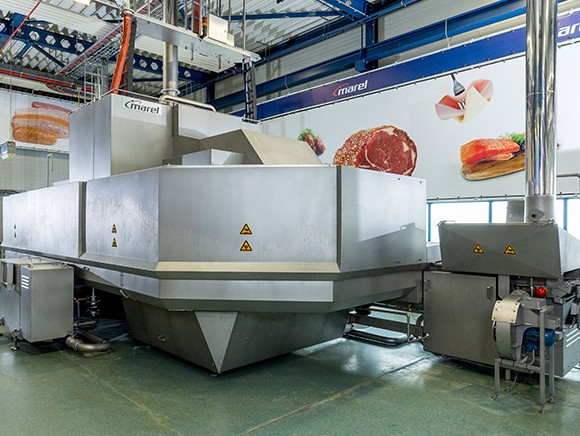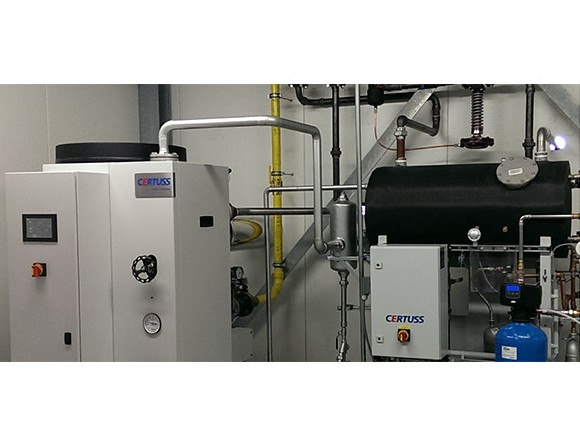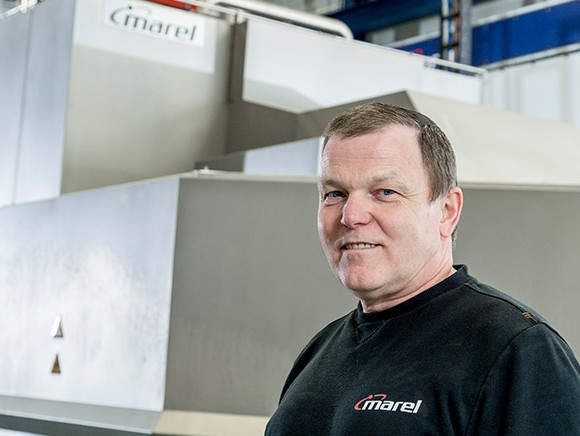
Many years ago, when the demo centre engineer Riny Engels set up a demonstration centre for Marel – which was still called Stork back then – in Boxmeer, the only technology that he didn’t source from within his own company was the steam boiler from Scharff Techniek based in Utrecht. It seems that there were no regrets about that decision, because Scharff remains the supplier of the company’s steam technology to this day.
In Boxmeer there are still many reminders of machine builder Stork, which was acquired by Marel. Across from the Marel Further Processing facility, for example, stands a small museum dedicated to Stork’s history, and even though the Stork name was recently dropped from the company’s marketing communications, the old brand name nevertheless accidentally crops up a couple of times as Riny Engels talks about the machines and the software in the demo centre – and that’s not surprising. Despite being immensely proud of Marel, he joined Stork 44 years ago and became Demo Center Engineer back in 1989. In the demo centre he puts individual machines and complete lines in the spotlights for his audience of customers and prospects.
Riny Engels: “The boiler is reliable, efficient and hence sustainable”
Marel, an international company with its headquarters in Iceland, builds machines for all kinds of food processing activities, mainly for meat, poultry, red meat and fish products, up to the packing of the product. The portfolio also used to include packaging machines, but those activities were divested. “The margins were too small,” comments Engels, “and hence are only interesting for industry specialists.”
Marel strives to gain a head start through truly innovative equipment. “We work together very closely with our customers – the food manufacturers – including on product development. They approach us with their product ideas and we find the right machine for them. We also help them to think about which new products could be successful for them. At Marel, we’re bang up to date on the developments in our customers’ markets.” Innovation is also one of Engels’ favourite topics. He enthusiastically demonstrates two examples of technology that have given Marel a real – and patented – head start. The first is the RevoPortioner, a forming machine based on a rotating drum. The machine preserves the texture and structure of the product, does not use any water and the technology facilitates a much higher production speed. In addition, the former minimises losses. Thanks to the drum, this showpiece produces products with a consistent shape and weight. The products are released from the drum using air pressure and carefully placed onto a discharge belt ready for further processing.

The second machine that Engels proudly demonstrates is a breading machine. The process to coat meat or fish in breadcrumbs may seem simple enough, but Marel has found interesting ways to make improvements. The crumb is now distributed more uniformly and retains the desired coarseness. Competitive machines suffer the well-known problem of the crumb becoming too fine over time due to the grinding motion. Both machines are suitable for the processing of vegetarian products in addition to meat and fish.
All of the equipment on display in the demonstration centre is mobile, apart from the biggest piece of machinery: the oven, where the formed and breaded products are cooked. The products pass through the oven’s two towers on a conveyor that is almost a hundred metres long. The cooking not only involves frying in sunflower oil; steam is used too. In fact, steam is indispensable because it produces a tender product; it prevents the product from drying out in the oven. “When I was tasked with the project to build and set up the demonstration centre many years ago, I went in search of the right steam boiler for our oven. I investigated the various possibilities and ultimately decided on a Scharff boiler. Since then, there’s never been any reason to reverse that choice. The boiler is reliable, efficient and hence sustainable.” The boiler in question is a dependable Certuss steam boiler, which is just one of many boilers in the portfolio of the family-owned company Scharff Techniek.
The Benelux region is the heart of Marel’s activities, with 1,800 of the company’s 4,700 global workforce being based there. The firm is working hard to further optimise its internal organisation. One aspect of the organisational changes is the expansion of the demo centre, which plays an important part in informing and convincing customers. Plans are being drawn up for expansion and renovation of the demonstration centre, and these plans will once again include a role for Scharff. There is still some way to go, however, explains Engels: “The demo centre is important, but so too is careful investment.”

Innovation
Riny Engels (59) was just 15 when he joined Stork, initially to continue his education. “That’s where my technical training really started, in the company’s classrooms.” Once he had learned the trade, he was allowed to set to work in the assembly department. To be honest, he has never stopped learning since, and has done courses in subjects such as precision mechanics. Although he enjoyed the assembly work, it didn’t really suit him. “I’m always looking for ways to do things even better.” The company soon spotted his talent for innovation. After his idea in the suggestion box was chosen as the winner for the third consecutive year, he was transferred to the R&D department. R&D and the demo centre were later merged; as they both continued to grow, he ultimately had to choose between them. The demo centre won.
www.marel.com
Source: © Studio38°C